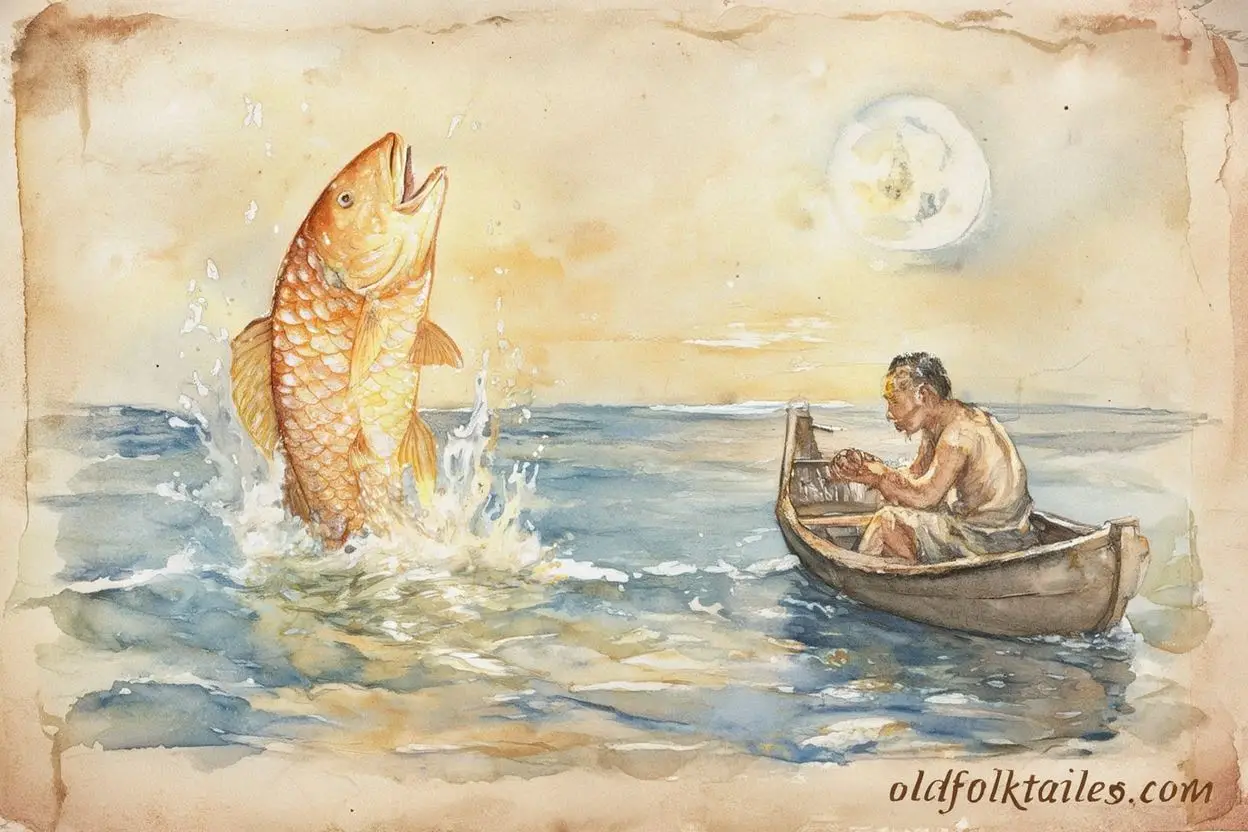Long ago, when the world was young and the sea still whispered secrets to those who listened, the people of Kiribati lived in harmony with the tides. The ocean was their mother and their mirror, providing food, guidance, and life. Among its many wonders was a legend told from one generation to another the tale of the Singing Fish.
This was no ordinary fish. Its scales shimmered like the morning sun on the lagoon, and its fins glowed faintly beneath the moonlight. But what made it truly extraordinary was its voice. Every dawn, as the horizon blushed with light, the fish would rise near the surface and sing. Its song was soft yet powerful, carrying across the waves like a prayer.
When the people heard it, their hearts became light, and even the roughest seas stilled. The elders said the Singing Fish was a spirit of the sea, sent by the gods to remind humanity of gratitude and peace. The fishermen would lower their nets only after hearing its song, believing that the ocean’s blessings began with its music.
For many years, harmony reigned. The fish sang, the people listened, and life moved gently with the rhythm of the tides. But one day, among the fishermen was a man named Tebana, who was known for his skill and for his hunger for more. Though he caught plenty, it was never enough. When others praised the Singing Fish, Tebana grew envious.
“If its song can calm the sea,” he thought, “surely its capture would bring me even greater fortune.”
That night, when the moon was high and silver paths glimmered across the water, Tebana took his canoe far from shore. The island slept, but his paddle whispered against the waves as he followed the faint music rising from the deep. The closer he drifted, the more he felt its beauty a voice that seemed to breathe through the stars themselves.
He threw his net wide. The water shimmered, and for a moment, the song grew louder then it stopped. When Tebana pulled the net in, he found the Singing Fish caught among the threads, its luminous body trembling. He stared at it in awe. Even in silence, it glowed like a piece of the moon fallen into his hands.
“Now the sea will sing for me alone,” he whispered, placing the fish gently in a basket.
The next morning, the island woke to a stillness it had never known. The sea, once alive with music and laughter, was quiet. The waves rolled sluggishly against the reef, and the sky felt heavy with grief. Fishermen rowed out but returned empty-handed. No fish appeared in their nets. No breeze moved the palms. Even the birds seemed to mourn.
The elders gathered and said, “Something sacred has been taken. Until it is returned, the sea will not forgive.”
Tebana sat in his hut, staring at the basket where the Singing Fish lay motionless. He tried to coax it to sing, but it remained silent. Each day that passed, the ocean grew darker and the shore withdrew its life. The coral faded, the tide receded, and hunger shadowed the island. Guilt settled upon Tebana like a weight he could not bear.
One evening, he took the basket and paddled alone into the sea. The stars watched him, and the water beneath his canoe was still as glass. “I was foolish,” he said into the wind. “I took what was not mine, and I silenced your song.”
He lifted the fish from the basket. It no longer glowed, its scales dull like stone. With trembling hands, he lowered it back into the water. “Forgive me,” he whispered, “and sing again if you will.”
For a moment, there was nothing but silence. Then, as his tears fell into the sea, a faint ripple shimmered outward. Tebana watched in awe as light began to return to the water. The fish’s fins fluttered, and its body brightened like dawn spreading beneath the waves. Slowly, it rose to the surface and turned toward him. Then, with a voice both sorrowful and kind, it began to sing.
The melody rolled across the sea, rising and falling like the breath of the world. It reached the shore, and the people came running, weeping with joy. The ocean stirred again, its colors deep and living. The fish circled Tebana once, then disappeared into the deep, leaving behind a trail of light that glowed until morning.
From that day forward, the sea sang once more, but it never allowed itself to be captured again. Tebana lived humbly, teaching others the lesson he had learned that greed breaks harmony, and only respect restores it. The people built small shrines along the shore, offering flowers and shells to the spirits of the sea.
When storms gathered, they listened carefully to the wind, believing the Singing Fish still lent its voice to calm the waters. And on nights when the sea shimmered with soft light, the elders would smile and say, “Tebana is forgiven. The sea remembers.”
Thus, the legend of the Singing Fish became a sacred reminder of the bond between humankind and the natural world, a bond that thrives only in respect and balance.
Moral Lesson:
The story of the Singing Fish teaches that harmony with nature is built upon respect. When humans act with greed and take without gratitude, they break the rhythm of creation. But through repentance and humility, balance can be restored, and life will sing again.
Knowledge Check:
1. What made the Singing Fish special?
It had a beautiful voice that could calm the sea and bring joy to the people.
2. Why did Tebana capture the fish?
He was greedy and wanted its power and blessings for himself.
3. What happened when the fish was captured?
The sea became silent, lifeless, and refused to provide food for the people.
4. How did Tebana restore peace to the sea?
He repented and returned the Singing Fish to its home in the ocean.
5. What does the fish’s song symbolize?
It symbolizes harmony, gratitude, and the living spirit of nature.
6. What is the main moral of the story?
Respect for nature brings peace, while greed brings loss and silence.
Source: Adapted from Oral Traditions of the Gilbert Islands by the Kiribati Folklore Preservation Project (2013).
Cultural Origin: Kiribati (Micronesia)









